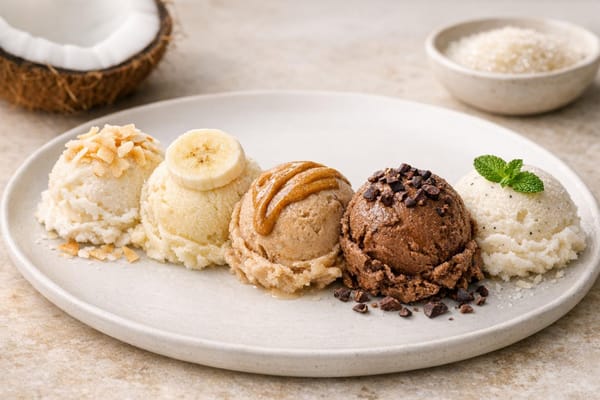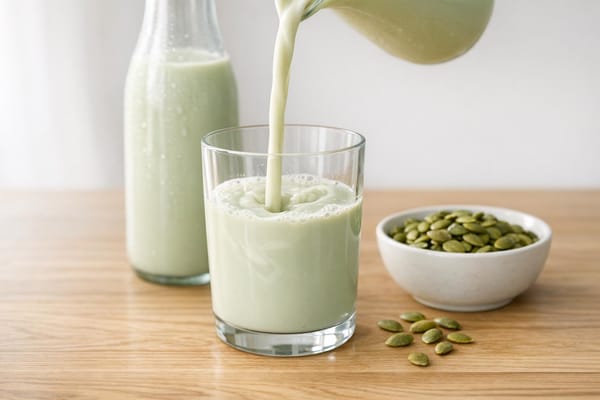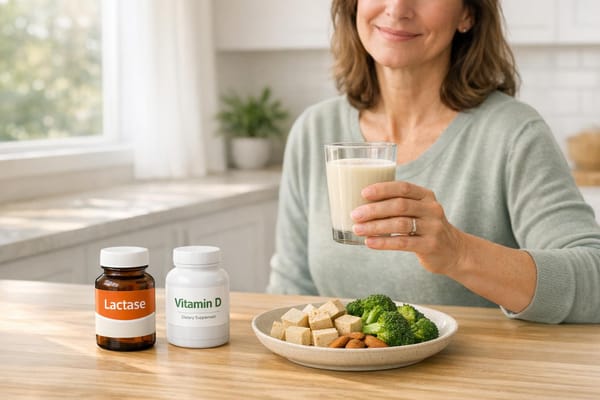Zinc Absorption in Lactose Intolerance
Lactose intolerance can hinder zinc absorption, but non-dairy options and enzyme supplements can help maintain zinc levels for better digestive health.

If you're lactose intolerant, your body struggles to digest dairy and may also have trouble absorbing zinc - a vital nutrient for gut health. Here's how to manage zinc levels:
- Eat non-dairy zinc-rich foods like oysters, beef, and pumpkin seeds.
- Use lactase enzyme supplements to help digest dairy and improve nutrient absorption.
- Consider zinc supplements if your diet lacks sufficient zinc.
Zinc supports digestion by strengthening the gut lining, but lactose intolerance can disrupt its absorption. Combining smart dietary choices with enzyme support can help maintain proper zinc levels and overall digestive health.
8 Factors Which Determine If You Can Absorb Zinc or NOT ...
How Zinc Supports Digestion
Zinc plays a key role in digestive health by helping maintain the gut lining's structure. It strengthens the tight junctions between intestinal cells, creating a barrier that keeps harmful substances out while allowing nutrients to be absorbed efficiently. This is especially important for individuals with lactose intolerance, who often struggle with proper nutrient absorption.
How Lactose Intolerance Affects Zinc Levels
Lactose intolerance, caused by a deficiency of lactase, can interfere with the body’s ability to absorb important nutrients like zinc.
Digestive Issues That Impact Zinc Absorption
When dairy products aren’t properly digested, the resulting digestive issues can disrupt the absorption of nutrients. Both the incomplete digestion of dairy and avoiding it altogether can contribute to lower zinc levels. Because of this, scientists are exploring how lactose intolerance may specifically influence zinc absorption.
Research on Zinc Absorption Efficiency
These digestive challenges have led to studies focusing on how well the body absorbs zinc under such conditions. Early findings suggest that zinc absorption may be negatively affected. Ongoing research continues to examine this link. Enzyme supplements like milktab, which combine lactase with other digestive enzymes, may help improve dairy digestion and, in turn, support better zinc absorption.
Ways to Increase Zinc Intake
Keeping your zinc levels in check involves a mix of smart dietary choices and, when needed, supplementation.
Non-Dairy Foods High in Zinc
For those looking to avoid dairy, there are plenty of foods that are naturally rich in zinc. Here’s a quick look at some excellent non-dairy options:
| Food Source | Serving Size | Zinc Content |
|---|---|---|
| Oysters | 3 oz | 74 mg |
| Crab | 3 oz | 6.5 mg |
| Pumpkin Seeds | 1 oz | 2.2 mg |
| Fortified Cereals | 1 cup | 2.8 mg |
| Beef | 3 oz | 5.3 mg |
Adding these foods to your meals can help you meet your zinc needs without relying on dairy products.
How Lactase Enzymes Can Help
If you’re lactose intolerant but still want to benefit from dairy’s nutrients, lactase enzymes can make a big difference. Products like milktab offer a triple-enzyme formula that aids in breaking down lactose, proteins, and fats. Each pill contains:
- 27,000 FCC units of lactase: Helps digest lactose effectively
- 22,000 FCC units of protease: Breaks down proteins
- 1,000 FCC units of lipase: Assists in fat digestion
This type of enzyme support not only improves dairy digestion but also helps your body absorb zinc more efficiently, making it a great complement to a balanced diet.
Should You Consider Zinc Supplements?
Sometimes, even with a well-rounded diet, you might need a little extra help. Zinc supplements can be a good option in cases like these:
- Digestive issues make it hard to absorb nutrients
- Your diet doesn’t include enough zinc-rich foods
- Blood tests show low zinc levels
- You’re on a strict dairy-free diet without proper alternatives
For adults, the recommended daily zinc intake is 11 mg for men and 8 mg for women. Always consult a healthcare provider before starting supplements, as too much zinc can interfere with the absorption of other essential minerals.
Conclusion
Managing zinc absorption with lactose intolerance involves a mix of dietary choices and enzyme support. This approach focuses on improving zinc intake while supporting overall digestive health.
Here’s how to make it work:
- Opt for non-dairy foods high in zinc.
- Incorporate lactase supplements, such as Milktab's triple-enzyme formula.
- Consider zinc supplements if your diet falls short.
One user shared their experience:
"Milktabs WORK!! I went on a European vacation and ate all the cheeses I wanted to! It was so great to have these tabs!!!!"



